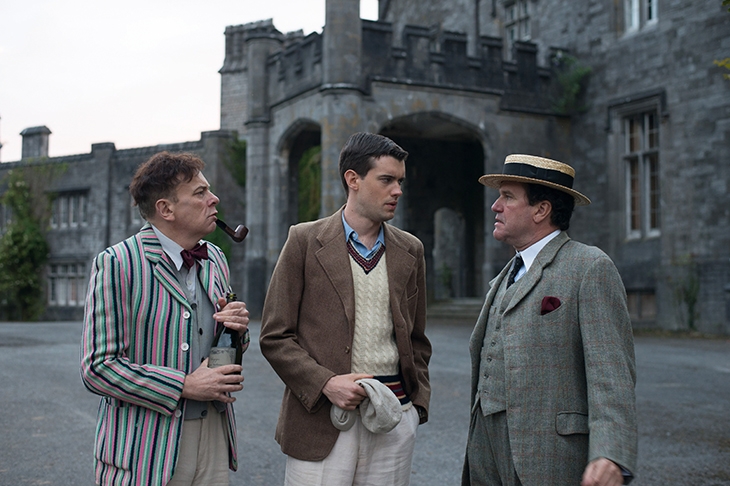Jack Whitehall could have been perfectly awful as Paul Pennyfeather in Decline and Fall (BBC1, Fridays). He has spent most of his career comically playing up to a common person’s idea of what a posh person looks like: the stand-up who went to the same public school (Marlborough) as Kate Middleton; JP, the Jack-Wills-wearing yah character from Fresh Meat, who went to Stowe; Alfie, the impeccably upper-middle-class, Mumford & Sons-loving history teacher, in Bad Education.
But Evelyn Waugh’s class humour is more sophisticatedly snobbish than that, written for a more discerning audience in the days — sigh — when even semi-educated people knew the order of precedence between a duke, a marquess, an earl and, say, a common-or-garden baron. Would Whitehall, lowly son of a mere theatrical agent, really be up to such subtleties? Or would he overplay it as yet another lovable, mugging Hooray?
Well, I’m happy to report that young Jack (still only 28, the bastard) has done Waugh proud. He has produced a performance, his most mature to date, entirely in the service of the part — which is to say, self-effacing, mildly bewildered, almost cipher-like in its modesty. Pennyfeather’s job, after all, is to act as the bemused butt of Waugh’s sadistic humour. The world is a cruel and unjust place, Waugh had already realised by the time (at 24) he published his first bestseller. Pennyfeather is his part autobiographical hero, part torture victim.
You see him play both roles in the glorious opening scene where the Bollinger (i.e. the Bullingdon) is holding one of its booze-ups, ‘baying for broken glass’, and Pennyfeather, a mildly studious, tweedy undergrad destined for the clergy, makes the mistake of walking across his college quad at just the wrong moment. His punishment is to be brutally debagged.
Afterwards, we see the college authorities discussing how to punish this terrible crime. By which, of course, they don’t mean the raucous toffs — who are immune because they can afford to buy their way out with fines — but Pennyfeather who, by allowing himself to become a victim in so vulgar a way, has proved himself quite unworthy of the college. Naturally, the only thing to do is send him down. ‘I expect you’ll want to become a schoolmaster,’ says the mildly sympathetic college porter as he hands back his room key. ‘That’s what most of the young gentlemen does that gets sent down for indecent behaviour.’
This is classic Waugh, his voice and humour already fully developed. You laugh because it’s so sharp and tight and funny. There are so many great one-liners, as when we overhear two dons looking down into the quad, salivating over the fines that will end up in the senior-common-room coffers. ‘It’ll be more if they attack the chapel.’ ‘Please God, let them attack the chapel.’
At the same time, it’s hard not to be repelled by the bleakness and callousness of Waugh’s world view which is — I suspect — tinged with not a little self-hatred. Waugh at Oxford — and he wasn’t the only one here present who felt that way — had more socially in common with Pennyfeather than he did with the Bollinger boys. Pennyfeather’s trials may be Waugh’s way of punishing himself for having been born such a frightful little oik.
This unsettling mix of hilarity and brittle ugliness may well be why Decline and Fall has not hitherto been adapted for TV. Get the tone even slightly wrong and you’d either end up with something queasily discomfiting or with something where all the jokes fall flat because everyone is just a caricature for whom you never really care.
With this quite superb adaptation —scripted by James Wood (creator of Rev) — you do care because he has played it absolutely dead straight. When one of the boys at Llanabba school’s sports day gets shot in the foot with the starter pistol drunkenly wielded by Mr Prendergast (Vincent Franklin) you see realistic blood pumping out. Which makes it all the more shocking and funny when the only response of the headmaster Dr Fagan (David Suchet) is to call out ‘Quick, feed him some cake’, while the boy’s mother looks on indifferently. The behaviour and attitudes are appalling but the brilliant cast members inhabit the characters as if they were sympathetic human beings, not grotesques.
Apparently, Wood was warned not to include Chokey, the comedy negro — temporary lover of Mrs Beste-Chetwynde — who professes his love of cathedrals and jazz. He did — though I didn’t catch him using the line where the vicar remarks that ‘the mistake was ever giving them their freedom. They were much happier and better looked after before.’ That would have been brave. Anyway, Chiké Okonkwo did a fine job of bringing the character to life — though perhaps someone ought to have shown him how to smoke a cigarette like an actual smoker, rather than as though a tiny touch gives you instant cancer. This is the 1920s, after all — autres temps, autres moeurs.







Comments